John Bryan Huston
Leo Brouwer is the most influential guitarist/composer of our time. This thesis will present an examination of his guitar music by exploring the simultaneous interaction of AfroCuban rhythms and musical gestures with contemporary (European and related) art music. Through the application and fusion of these two styles in his guitar music, Brouwer creates original techniques and textures for the instrument. From an analytical or performance perspective, specific knowledge of this stylistic and gestural synthesis is vital to understanding Brouwer’s musical expression and compositional process. For this study I will examine Danza característica (1957), El decameron negro (1981), Paisaje cubano con rumba(1985), and Rito de los orishas (1993). Brouwer’s use of Afro-Cuban musical referents will be shown to fall into three nonexclusive categories: Specific derivation from Afro-Cuban forms and genres, general derivation from rhythms and gestures widely used in Afro-Cuban (and derived) musical styles, and folkloric/historical derivation where Afro-Cuban sociological and religious elements serve as poetic or programmatic referents. By drawing on the works of numerous Cuban music scholars, I will document these Afro-Cuban genres and musical traits, and demonstrate Brouwer’s
methods of derivation and reference in his music for guitar.





